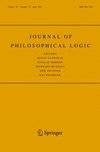Truth Meets Vagueness. Unifying the Semantic and the Soritical Paradoxes
IF 0.7
1区 哲学
0 PHILOSOPHY
引用次数: 0
Abstract
Abstract Semantic and soritical paradoxes display remarkable family resemblances. For one thing, several non-classical logics have been independently applied to both kinds of paradoxes. For another, revenge paradoxes and higher-order vagueness—among the most serious problems targeting solutions to semantic and soritical paradoxes—exhibit a rather similar dynamics. Some authors have taken these facts to suggest that truth and vagueness require a unified logical framework, or perhaps that the truth predicate is itself vague. However, a common core of semantic and soritical paradoxes has not been identified yet, and no explanation of their relationships has been provided. Here we aim at filling this lacuna, in the framework of many-valued logics. We provide a unified diagnosis of semantic and soritical paradoxes, identifying their source in a general form of indiscernibility. We then develop our diagnosis into a theory of paradoxicality, which formalizes both semantic and soritical paradoxes as arguments involving specific instances of our generalized indiscernibility principle, and correctly predicts which logics can non-trivially solve them.真相与模糊相遇。统一语义悖论与社会悖论
语义悖论和寓言悖论具有显著的家族相似性。一方面,一些非经典逻辑已经被独立地应用于这两种悖论。另一方面,复仇悖论和高阶模糊性——在针对语义和社会悖论的解决方案的最严重问题中——表现出相当相似的动态。一些作者认为,这些事实表明,真理和模糊性需要一个统一的逻辑框架,或者真理谓词本身是模糊的。然而,语义和社会悖论的共同核心尚未被确定,也没有解释它们之间的关系。在这里,我们的目标是在多值逻辑的框架中填补这一空白。我们提供了一个统一的诊断语义和社会悖论,确定其来源在一般形式的不可区分。然后,我们将我们的诊断发展成一种悖论理论,它将语义和逻辑悖论形式化,作为涉及我们的广义不可分辨原则的具体实例的论证,并正确预测哪些逻辑可以非平凡地解决它们。
本文章由计算机程序翻译,如有差异,请以英文原文为准。
求助全文
约1分钟内获得全文
求助全文
来源期刊

JOURNAL OF PHILOSOPHICAL LOGIC
PHILOSOPHY-
CiteScore
2.50
自引率
20.00%
发文量
43
期刊介绍:
The Journal of Philosophical Logic aims to provide a forum for work at the crossroads of philosophy and logic, old and new, with contributions ranging from conceptual to technical. Accordingly, the Journal invites papers in all of the traditional areas of philosophical logic, including but not limited to: various versions of modal, temporal, epistemic, and deontic logic; constructive logics; relevance and other sub-classical logics; many-valued logics; logics of conditionals; quantum logic; decision theory, inductive logic, logics of belief change, and formal epistemology; defeasible and nonmonotonic logics; formal philosophy of language; vagueness; and theories of truth and validity. In addition to publishing papers on philosophical logic in this familiar sense of the term, the Journal also invites papers on extensions of logic to new areas of application, and on the philosophical issues to which these give rise. The Journal places a special emphasis on the applications of philosophical logic in other disciplines, not only in mathematics and the natural sciences but also, for example, in computer science, artificial intelligence, cognitive science, linguistics, jurisprudence, and the social sciences, such as economics, sociology, and political science.
 求助内容:
求助内容: 应助结果提醒方式:
应助结果提醒方式:


